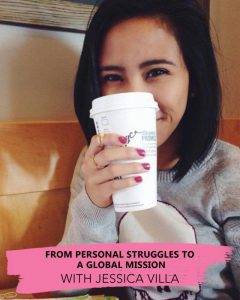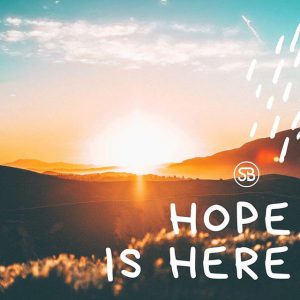Trends in music come and go, but some things never change. Kids will always find ways to be cruel to each other, it will always be tough to be a teenager, and music will always have the power to heal and bring us together. Jessica Villa Sikora, founder of the nonprofit and online community Superbands, can attest to all of those things. When she was in her darkest places as an adolescent and young adult, she turned to music and the community surrounding it to heal her – and now she is trying to help young people in similar positions.

“I Felt So Lost, Helpless, and Alone”
Everyone has been a middle schooler, so it is easy to understand the beginning of Jessica Villa Sikora’s story. When asked about the origins of her nonprofit, which seeks to support young people struggling with mental health issues, she paused, and laughed: “Well, middle school and high school girls are, um, quite mean.”
What she can look back and laugh at now was deadly serious at the time, though. She – like many of us – felt like she didn’t fit in at a new school, was shy and anxious, and was bullied mercilessly. She faced feelings of inadequacy, compounded by feelings of ingratitude to her immigrant parents, whom she felt had sacrificed so much for her to have a comfortable life in the US. For their part, they didn’t understand her struggle, and Sikora felt like she couldn’t talk to them about the bullying or the depression that was beginning to cloud her life. And so her downward spiral began.
What you might also recognize about Sikora’s story, unfortunately, is where her story goes next. Not only is bullying all too common – about 1 in 5 students report being bullied – but so are the mental health issues that Sikora began to experience as a young teenager. Almost 17% of young people aged 6 -17 – or 1 in 6 – experience mental health disorders, and that is just the number of people who are diagnosed. Among those, only around 50% receive treatment, and the average delay between the onset of mental health symptoms and treatment is 11 years. For many, help can come too late.
Depressed and anxious, Sikora began self-harming and attempting suicide before she even hit the age of 18. “I felt so lost, helpless, and alone,” she said, “and I didn’t know what I could do to ‘make myself better’.” Like many young people facing mental health issues, she was afraid to speak out, and was among the number who go undiagnosed and slip through the cracks. “My parents didn’t want to ‘waste’ money on therapy,” she said. But luckily, Sikora had something to lean on, something that became a way to “cope with my inner demons”: music. She found strength in a feeling of community, and eventually, within herself, and things began to turn around.

“It Was My Safe Place, My Escape”
Jessica Villa Sikora feels lucky that, despite her lack of support and treatment, she was able to pull herself out of all that, as she says. She’s very lucky, indeed. Sikora could have ended up another terrifying statistic: suicide is the second leading cause of death among Americans aged 10 – 34. So what helped her? “There was one thing I relied heavily on every moment I wasn’t in school – one thing that my parents would spend money on,” said Sikora. That thing was music.
Every day at school for Sikora was “a countdown to the next concert, the next album release. I pulled myself out of [my depression] based on looking forward to things, and on seeing the friends I made at concerts.” She found a community of “other weird Jonas Brothers [her favorite band] girls,” and the “weird” girls sitting next to her went from being “people I didn’t even know” to lifelong friends, who gave her a sense of belonging and have remained in her life – she’s even gone to their weddings.
So where does her story go from there? To a place we can only hope that it goes for any young person struggling with mental health issues. The quiet, bullied girl who had found community in music also began to find strength in herself. “By senior year [of high school], the girls who bullied me kind of grew up. I went to college, moved to campus, made new friends. [I realized] you can be literally anyone you want to be, so I told myself I’m not going to be the shy girl anymore and pursue the things I’m passionate about. You know, you attract the right kind of people when you start to figure out who you really are.”
“Every Time I Feel Like Giving Up, I Think: They’re Watching Me!”
After college, the once shy and anxious Sikora had big dreams about becoming a high-powered CEO. Philanthropy was not even something on her radar. She moved home after college to figure out her next move, and there she saw that her 13-year-old sister had become exactly like her: obsessed with music. Watching her sister, and reliving the pain of her own adolescence, she realized she didn’t want her sister – or anyone else – to go through what she had gone through. That’s when the idea for Superbands came to her – she wanted to create an online community to give struggling young people the same sense of belonging through music that she had found.

When Sikora put the idea out there to the world of the internet, she was astonished to find herself with thousands of followers overnight. People were sharing their stories and telling her how much they needed her idea to work. What had begun as a tentative idea now seemed to be something she had to do: “Oh my god, I can’t not do this now,” she thought when she read all of the harrowing stories of teenage pain.
So she began building her online community, working through “trial and error, honestly…I ran everything through Google.” She thought many times, “Forget this, this is taking up too much of my time and money. But the universe kept telling me to keep going. The manager of the Jonas Brothers began following me on Instagram! Now, every time I feel like giving up, I think: ‘they’re watching me!’” And just when she was going to quit once and for all, the Jonas Brothers announced a reunion tour. She told herself it was a sign, and she kept going, promising herself one more year to try. After she went to the Jonas Brothers reunion tour concert in 2019, she felt a renewed sense of purpose.
A new idea hit Sikora after that concert: “I pivoted and didn’t give up on the idea of the online community, but now we want to bring teens and adolescents to concerts so they can have a night to remember when life gets hard and things suck. Then they’ll have these memories to hold onto, just like I had. I decided I wanted to turn it into a sort of ‘make a wish foundation,’ but in a mental health and music way. I’ve dealt with this invisible illness, and I thought: ‘what if we could give them one night away from it all?’”
So, in March of 2020, Superbands officially became a 501c3 nonprofit organization, and Sikora began doing the hard work of making that dream a reality. Then the unexpected happened: the COVID-19 pandemic hit, and concerts everywhere were cancelled. Sikora was disappointed, but she is ever-resilient in face of challenges: “Life is really what you make of it,” she said. “Rather than sitting around and being sad, this means that music execs are sitting home with time on their hands, too…So I started reaching out to them, putting all of my time into that, using this time to build connections, and they have been very receptive. So now I’m getting things into place to start making wishes come true.”
“I’ve Just Figured Out Who I Am”
Even with the setback of the pandemic, Superbands isn’t going anywhere anytime soon. The online community is still thriving, and Sikora is thrilled that everyday she can see the reach that her group has, as members interact with each other and repost content. And now, there are over 700 people on the Superband’s waiting list, hoping to have their dreams of seeing a concert or meeting their favorite band a reality, and Sikora has ideas for how to make that happen as quickly as possible. “Maybe the first event will be a virtual one,” she suggested. “Then we won’t just be changing one person’s life, but we could be throwing 3, 4, 5 people on a Zoom chat and quickly and easily changing all their lives. If we could partner with a large donor, they could easily pay the fees for meeting the person, and change someone’s life.”
Sikora is impressively dedicated to making this all happen, and excited about the prospect – it’s easy to see that she genuinely wants to make a difference, no matter how big or small. “If we can make one person’s wish come true, and then it falls apart, at least we can say we changed one person’s life,” she said. But what about her life? How has it changed as her story has progressed from that of a troubled teen to the head of a nonprofit?
“I’ve learned to pull myself out of my comfort zone – you have to just go after what you want, if you want to connect with someone, reach out to them. I’ve also learned to pick myself up when I fall down and have changed the mentality of being afraid – I’ve gotten better at giving myself a little bit of grace. I’m still trying to figure life out, but that’s ok, more than anything I’ve just figured out who I am.” We could all use a little bit of that “grace,” and use it, like Sikora, to try to make a difference in the lives of others.
If you’d like to help, you can donate to Superbands here. For mental health resources, check out Superband’s excellent list here. Most importantly, never forget what it felt like to be a young person, and lend an ear and assistance whenever you see instances of bullying or recognize the signs of mental health issues.
